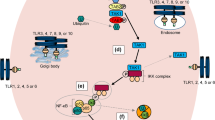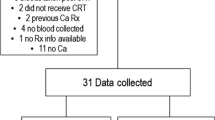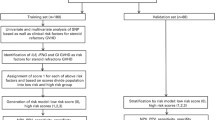Abstract
Purpose
Severe chemotherapy-induced gastrointestinal toxicity (CIGT) is common and results in treatment delays, dose reductions, and potential premature treatment discontinuation. Currently, there is no diagnostic marker to predict CIGT. Proinflammatory cytokines, produced via toll-like receptor signaling, are key mediators of this toxicity. Hence, this pilot study investigated the association between immune genetic variability and severe CIGT risk.
Methods
Genomic DNA from 34 patients (10 with severe CIGT) who had received 5-fluoruracil-based chemotherapy regimens was analyzed for variants of IL-1B, IL-2, IL-6, IL-6R, IL-10, TNF-a, TGF-b, TLR2, TLR4, MD2, MYD88, BDNF, CRP, ICE, and OPRM1. Multivariate logistic regression created a prediction model of severe CIGT risk.
Results
There were no significant differences between patients with and without severe CIGT with regards to age, sex, type of cancer, or chemotherapy treatment regimens. The prediction model of severe CIGT risk included TLR2 and TNF-a genetic variability and cancer type (colorectal and gastric). This prediction model was both specific and sensitive, with a receiver operator characteristic area under the curve of 87.3 %.
Conclusions
This is the first report of immune genetic variability, together with cancer type, being predictive of severe CIGT risk. These outcomes are being validated in a larger patient population.

Similar content being viewed by others
References
Sonis ST, Elting LS, Keefe D, Peterson DE, Schubert M, Hauer-Jensen M, Bekele BN, Raber-Durlacher J, Donnelly JP, Rubenstein EB, Mucositis Study Section of the MASCC and the ISOO (2004) Perspectives on cancer therapy-induced mucosal injury: pathogenesis, measurement, epidemiology, and consequences for patients. Cancer 100(9 Suppl):1995–2025
Sonis ST (2007) Pathobiology of oral mucositis: novel insights and opportunities. J Support Oncol 5(9 Suppl 4):3–11
Stringer AM, Al-Dasooqi N, Bowen JM, Tan TH, Radazum M, Logan RM, Mayo B, Keefe DMK, Gibson RJ (2013) Potential biomarkers of chemotherapy-induced diarrhea: a clinical study of intestinal microbiome alterations; intestinal inflammation and circulating matrix metalloproteinases. Support Care Cancer 21:1843–1852
Carlotto A, Hogsett VL, Mairorini EM, Razulis JG, Sonis ST (2013) The economic burden of toxicities associated with cancer treatment: review of the literature and analysis of nausea and vomiting, diarrhoea, oral mucositis and fatigue. Pharmacoeconomics 31:753–766
Logan RM, Stringer AM (2008) Serum levels of NF-κB and pro-inflammatory cytokines following administration of mucotoxic drugs. Cancer Biol Ther 7:1139–1145
Morales-Rojas T, Viera N, Moron-Medina A, Alvarez CJ, Alvarez A (2012) Proinflammatory cytokines during the initial phase of oral mucositis in patients with acute lymphoblastic leukaemia. Int J Paediatr Dent 22:191–196
van der Welden W (2011) Mucosal barrier injury, innate immunity, and stem cell transplantation. Radboud University, Nijmegen Medical Centre, Nijmegen
Cortejoso L, Lopez-Fernandez LA (2012) Pharmacogenetic markers of toxicity for chemotherapy in colorectal cancer patients. Pharmacogenomics 13:1173–1191
Sakamoto K, Oka M, Yoshino S, Hazama S, Abe T, Okayama N, Hinoda Y (2006) Relation between cytokine promoter gene polymorphism and toxicity of 5-fluorouracil plus cisplatin chemotherapy. Oncol Rep 16:381–387
Bogunia-Kubik K, Polak M, Lange A (2003) TNF polymorphisms are associated with toxic but not with aGVHD complications in the recipients of allogenic sibling haematopoietic stem cell transplantation. Bone Marrow Transplant 32:617–622
R Core Team (2013) R: A language and environment for statistical computing. R Foundation for Statistical Computing, Vienna
Ovsyannikova IG, Haralambieva IH, Vierkant RA, Pankratz VS, Jacobson RM, Poland GA (2011) The role of polymorphisms in toll-like receptors and their associated intracellular signaling genes in measles vaccine immunity. Hum Genet 130:547–561
Acknowledgments
JM Bowen was a recipient of a National Health and Medical Research Council (Australia) Post-doctoral Training Fellowship. This research was supported by an Australian Dental Research Foundation Inc. Project grant.
Conflict of interest
The authors have no financial relationship with the Australian Dental Research Foundation Inc, have full control of the primary data of this research study, and agree to allow to data review if requested by the journal.
Author information
Authors and Affiliations
Corresponding author
Rights and permissions
About this article
Cite this article
Coller, J.K., White, I.A., Logan, R.M. et al. Predictive model for risk of severe gastrointestinal toxicity following chemotherapy using patient immune genetics and type of cancer: a pilot study. Support Care Cancer 23, 1233–1236 (2015). https://doi.org/10.1007/s00520-014-2481-z
Received:
Accepted:
Published:
Issue Date:
DOI: https://doi.org/10.1007/s00520-014-2481-z




